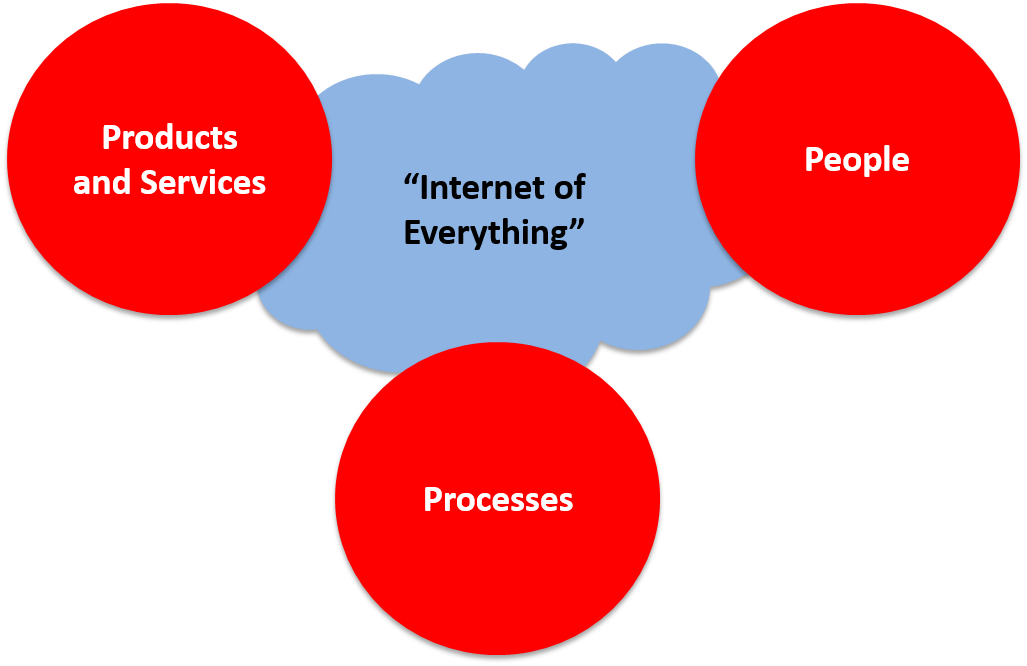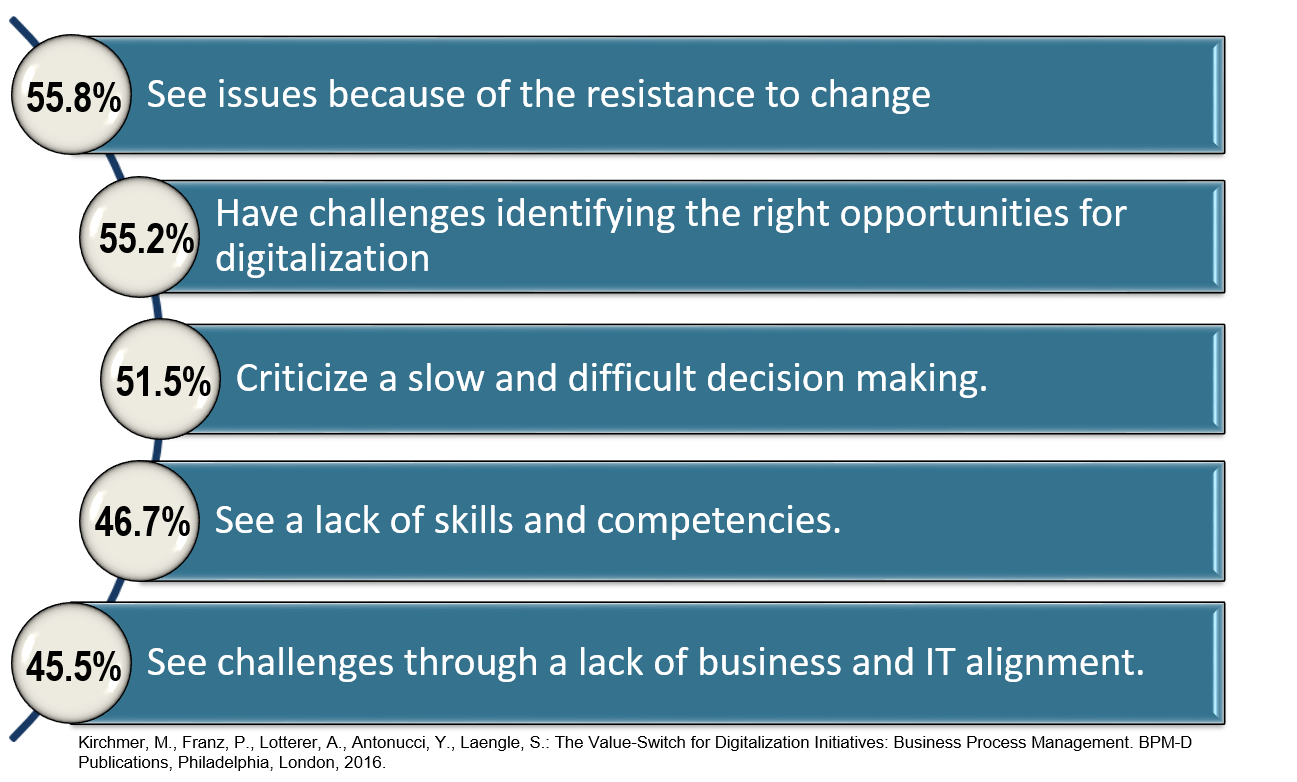The Digital World – a Powerful new Business Environment
Digitalization has become a powerful force at almost every organization. The integration of products and physical objects, people, and processes based on the “internet of everything” paves the way to disruptive innovation and new business models. A company can produce for example sports shoes based on the individual requirements of a specific client stored in transponders fixed to the shoe. The shoe “communicates” to the different machines to trigger the appropriate production activities. This “mass-individualization” allows the organization the ability to meet individual customer requirements at a reasonable price. Intelligent process management systems react to events, like changes of environmental data. Mobile devices, social media approaches, the handling of huge amounts of data in a short time through ”Big Data” approaches, related new analytics capabilities, or the use of cloud-based applications accelerate those developments. The definition of Digitalization is visualized in Fig. 1. [1]

Figure 1: Definition of Digitalization
The continuously growing computing power enables formerly unimaginable business performance – only if you manage the digital technology appropriately so that it provides real value through better or completely new business processes. Many organizations recognize this, however they are not sufficiently prepared to achieve this high performance through digitalization.
Most Organizations are Not Ready for the Digital World
According to a recent study by The Gartner Group [2] only 1% of businesses have processes in place that can be adjusted quickly enough to benefit fully from digitalization. This means that most organizations are not prepared to realize the full potential of their digitalization efforts. This is consistent with the first findings of a study by BPM-D, Widener University and the Universidad de Chile with over 200 organizations around the world. Over 55% of the respondents answered that it is a key challenge to identify the right opportunities for performance improvements through digitalization. In addition most organizations struggle with their slow decision making and the overall resistance to change. Fig 2 shows the key obstacles organizations see for digitalization.

Figure 2: Key Obstacles for Digitalization [2]
The discipline of business process management (BPM) helps to overcome those obstacles and realize the full potential of digital initiatives. The BPM-Discipline transfers the business strategy into people and technology based execution, at pace with certainty [3]. It provides the transparency and structure necessary to achieve high performance through the right degree of digitalization. It focuses initiatives on what really matters, improves business through the right combination of people and digital technologies, and helps to sustain improvements through agile process governance.
Focus on what Really Matters to Execute your Strategy
Once the overall business strategy reflecting the desired impacts of digital technologies is defined, a focused strategy execution is required. Potentially cost and time intensive digital initiatives need to target the right business areas to deliver their full value. The BPM-Discipline helps to identify those high impact processes where digitalization can make a real difference. Process innovation and disruptive improvements lead in those areas to competitive advantage. Previous solid academic and practice research has shown that these are only 15-20% of an organization’s processes, more than 80% of the processes are pure commodity processes where you just want to meet average performance by copying industry standards [4]. The BPM-Discipline helps to target value.
Improve the Right Way
Even high impact business processes require a differentiated improvement approach. Achieving high performance does not mean digitalization of everything. An insurance company, for example, may fully automate the handling of simple standard claims using the right process execution and rules engine. The same improvement approach does not fit for the handling of complex less often occurring claims. Here a people based execution with some support of the access to an appropriate knowledge base may deliver better results. The standardization of the sales processes of a company across different subsidiaries may lead to more value than the total optimization and automation of a few. Process innovation may be the right approach to configure the products of a biotech company but may not be the best approach for their warehouse management. The BPM-Discipline identifies the most appropriate improvement approach and combines people and digital technology to achieve best performance results.
Sustain Improvement Results
Once a process is improved, transformed or newly established it is crucial to keep on watching it and make adjustments when necessary. Our volatile digital world does not allow for any relaxing time for many processes. Change and on-going improvement must become part of the day-to-day business. The BPM-Discipline provides agile and pragmatic governance processes executed through appropriate roles and tools [3]. The resulting process of process management itself becomes subject to the right degree of digitalization, for example by leveraging collaborative process repository tools, cloud-based process execution or social media approaches for appropriate process community management. The BPM-Discipline creates a value-network that drives high performance into the organization –applying the right degree of digitalization.
The BPM-Discipline in a digital world: Focus – Improve – Sustain
Digitalization requires an appropriate company specific and value-driven BPM-Discipline to deliver best business outcomes for an organization. It helps to focus on what really matters, improve having the specific opportunity in mind and sustain those improvements through agile networks of people. The BPM-Discipline enables high performance through digitalization – fast and at low risk. It becomes the “value-switch” for digitalization.
References
[1] Kirchmer, M., Franz, P., Lotterer, A., Antonucci, Y., Laengle, S.: The Value-Switch for Digitalization Initiatives: Business Process Management. BPM-D Publications, Philadelphia, London, 2016
[2] Cantara, M.: Start up your Business Process Competency Center. In: Documentation of The Gartner Business Process Management Summit, National Harbor 2015.
[3] Kirchmer, M., Franz, P.: The Process of Process Management – Strategy Execution in a Digital World. BPM-D Whitepaper, Philadelphia, London 2015.
[4] Kirchmer, M., Franz, P.: Targeting Value in a Digital World. BPM-D Whitepaper, Philadelphia, London 2014.

















